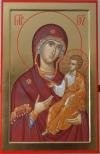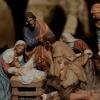
The Emotions and Affections of Jesus: An analysis of the Synoptic Gospels
In this article we will try to open a window onto the interiority of Jesus as transmitted to us in the Synoptic Gospels. The most vivid and nuanced description of Jesus’ emotions and affections is found in the Gospel of Mark. Matthew and Luke are more sober but no less significant in portraying the interiority of the Son of God.










.jpg)





.jpg)



